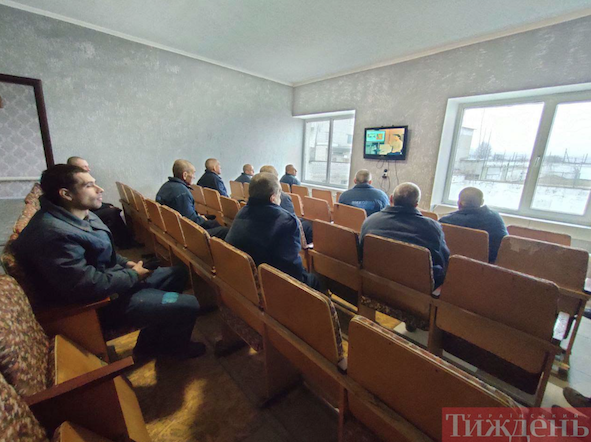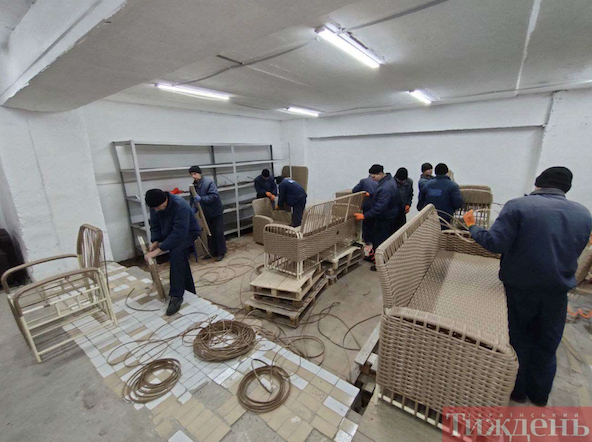Under the ‘Hochu Zhyty’ (‘I Want to Live’) programme, entire platoons sometimes surrender; the peaks of Russian surrender to captivity depend not so much on the intensity of the fighting as on media activity.
***
“I Want to Live” is a state initiative led by the Coordinating Staff on Prisoners of War Affairs, established in September 2022. The programme is effectively managed by the Main Intelligence Directorate. Its goal is to facilitate the safe surrender of Russians as prisoners of war.
“On average, they [Russians – ed.] surrender every other day. There are weeks when no one surrenders. Sometimes, a small unit surrenders, just a platoon. And, in fact, it’s best and simplest for us to work with groups of people because each crossing organisation is a certain task involving resources. So when even a few people surrender, it justifies the effort expended,” explains Petro Yatsenko, spokesperson for the Coordinating Staff on Prisoners of War Affairs. “But, of course, individuals surrender as well. The process continues.”
The programme began operating literally a few days before Putin announced the general mobilisation of 2022.
Initially, Russians didn’t believe it was a real line—they thought it was a pretext used by the FSB to gather data on potential traitors. However, after several months of media work, and especially since the project’s spokesperson was an actor who had previously appeared in a Russian series, it became easier for Russians to trust because of the familiar face.
“Plus, we always emphasised that this is a state project. About a month after we launched, our website was blocked by Roskomnadzor [a Russian federal agency responsible for monitoring, controlling and censoring mass media – ed.], and it was a little celebration for us,” Yatsenko laughs.

Currently, the project encompasses several hundred domain names, with Telegram serving as the primary means of communication. Consequently, blocking poses no issue. Initially, only two operators manned the hotline, but their numbers later expanded significantly. The precise count remains undisclosed.
The volume of calls hinges less on the intensity of combat than on various media campaigns. “For instance, following the ‘Synytsia’ (‘Titmouse’) project, call volumes spiked considerably. Similarly, they surged in anticipation of the Ukrainian counteroffensive in spring 2023.
Each media event suggesting normal conditions in captivity, the potential to acquire funds, all mobilisations, and all coercive methods of enlisting military personnel into the army of the aggressor state provoke an uptick in calls and inquiries.”
In the early stages, many individuals who hadn’t served but suspected they might be conscripted were reaching out. There were also numerous calls from relatives overseas; “Grandmothers were ringing from the United States: their grandson is in St. Petersburg, and the grandmother wants to know how he can surrender if he’s conscripted.”
There have been instances where relatives from within Ukraine also reached out, asking about individuals residing in Russia with Russian citizenship. They were also eager to learn about the surrender process.
The Coordination Headquarters was struck by the case of one early surrenderer, Mikhaylo: “He was like a character from the novels, a very distinctive Russian. He addressed his mother as ‘matyushka.’ Very astute. He wasn’t supposed to be conscripted into the Russian army because he had a certificate stating he was registered at the psychoneurological dispensary. But he was drafted nonetheless.”
“Our goal isn’t just about being taken as prisoners. There are Russians willing to collaborate. They’re engaged in cooperation, not necessarily needing to surrender. However, they can reach out to the hotline and offer their assistance. So, cooperation would be a positive aspect if they find themselves in captivity,” explains Petro Yatsenko.
“If those who surrendered as captives don’t wish to return to the Russian Federation, they won’t be forcibly exchanged or repatriated. As per the law, for the duration of the war, they’re considered prisoners of war. Once the war concludes, they’ll have the option to seek asylum in European countries, as there’s a corresponding agreement.”

“Quite a few of these Russian POWs want to go back,” Yatsenko shares. “And it’s possible because it hasn’t been officially disclosed that they surrendered voluntarily. Documents are handled the same way as for those who simply ended up in captivity. Ukrainians don’t publicise that they surrendered under the program.”
“Among those who surrendered are activists who protested against the war and were later sent to the front.
“These are also people from the occupied territories. There are those who simply do not want to fight. “There are those who call and cry: I don’t want to live in Russia; take me as a prisoner. Very different people, very different stories.”

